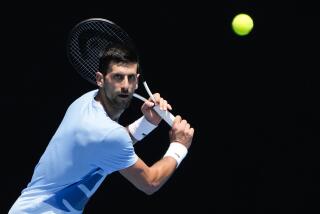Russian Has Day in Sun
- Share via
MELBOURNE, Australia — Yevgeny Kafelnikov of Russia knew it would be this way, making two predictions before the Australian Open men’s final.
1. It would be a long match.
2. His opponent, Thomas Enqvist of Sweden, had a tendency to get nervous in the key moments, not choking, but perhaps misfiring on his shots in the latter stages.
Two for two.
And now, the 10th-seeded Kafelnikov is two for two in Grand Slam finals, as he defeated Enqvist, 4-6, 6-0, 6-3, 7-6 (7-1), in 2 hours 26 minutes here today. He recorded 15 aces, and turned the match around in dramatic fashion, taking control by winning nine consecutive games.
The streak started after he lost a tense first set, in which Enqvist came out firing, hitting 16 winners and six aces. Kafelnikov stayed resolute and started changing the pace, moving Enqvist around the court, and rattled off nine games in a row, winning the second set, 6-0, and taking a 3-0 lead in the third.
Enqvist got rattled himself and never truly recovered.
His early composure did not resurface, and Kafelnikov won the third set, and the fourth-set tiebreaker by staying patient and consistent.
“He played too solid for me today,” Enqvist said. “Next year, maybe, I can go all the way.”
For the 24-year-old Kafelnikov, the title was redemption after a shaky 1998, in which he missed the Australian Open because of a knee injury after a skiing accident, and followed with a second-round loss at the French Open, a first-round loss at Wimbledon and a fourth-round defeat at the U.S. Open.
“I already know what it takes and what it feels like to win a Grand Slam,” said Kafelnikov, the 1996 French Open champion. “When I did win the French Open final, I wasn’t really thinking about it, it was just a quick moment. Now I can really enjoy it. It’s a great feeling.
“The last important thing is that this was the last tournament of this century [here] and I am very happy to win it.”
Then he had to give his proper due to one more person, who was never anywhere near Melbourne the last two weeks: Pete Sampras.
“The last message is to one person, Pete, it is really a great wonderful feeling,” said Kafelnikov, smiling. “Thanks for letting me do this.”
Sampras skipped the Australian Open because of exhaustion but remains No. 1 anyway. With his victory, Kafelnikov will be No. 3 in the world behind Sampras and Alex Corretja of Spain when the new rankings are released Monday.
Enqvist, who lost his first match in 1999, will be No. 11.
For Larry Stefanki, Kafelnikov’s new coach from Southern California, the title was extra special because of the final here last year. Then, he was coaching the enigmatic Marcelo Rios of Chile, who was blown off the court by Petr Korda in straight sets.
“This is the first Slam win,” Stefanki said. “I was on the other side of the coin last year and it wasn’t fun. The guy [Kafelnikov] is such a great guy, a breath of fresh air to work with and I couldn’t be happier for him. It’s a coach’s dream.
“My game is to win Slams and get him to No. 1. I thought he had a chance to win Australia. He won in Moscow [in November] and he said, ‘This doesn’t matter to me. It’s next year. I’m starting in Australia. I’m giving it 110%. I want to win Slams, get to the top and I want to be No. 1 at the end of ’99.’ It is a shot to win the first one out of the blocks [together].”
For Enqvist and the large contingent of vocal Swedish fans, the fourth-set tiebreaker was painful. Kafelnikov, simply keeping the ball in the court, watched Enqvist unravel with a series of errors, including two double-faults.
Kafelnikov led, 5-0, in the tiebreaker before Enqvist could break through. At 5-1, Kafelnikov set up match point with a forehand winner into the open court.
It took one match point for him to secure his second Grand Slam singles title and one more double-fault from Enqvist. Enqvist double-faulted on match point, pushing his second serve long.
“The game plan was very simple,” Kafelnikov said. “I try to place as many balls as I can, and I knew I will get the chances. Like I was saying before, and basically what happened, I broke Thomas mentally.”
Tennis Notes
After winning the men’s doubles final Saturday, Patrick Rafter of Australia and Jonas Bjorkman of Sweden expressed disappointment that the High Court in London blocked--at least temporarily--the International Tennis Federation from appealing Petr Korda’s drug case to the Court of Arbitration for Sport. Next, the ITF is expected to appeal the ruling at the civil Court of Appeal in London.
“It’s sad for tennis because that makes a lot of guys think that they’ve got a chance to get away with cheating,” Bjorkman said. “I have nothing against Korda. I’ve been frustrated by the situation, how it is working. We need to be tough on those things when it happens . . . “
Rafter picked up on the theme, saying: “There’s no excuse, I don’t care how good a bloke you are. There’s no reason why you should get away with [it]. I went and did a drug test yesterday and said, ‘This is a pointless bloody operation.’ ”
More to Read
Go beyond the scoreboard
Get the latest on L.A.'s teams in the daily Sports Report newsletter.
You may occasionally receive promotional content from the Los Angeles Times.











